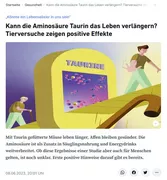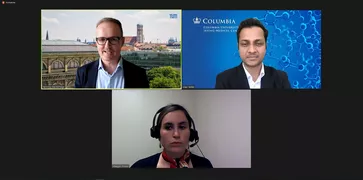Taurine deficiency is one of the driving forces behind aging in humans and animals. This has been shown by a new study with the participation of Prof. Dr. Henning Wackerhage's Associate Professorship of Exercise Biology, which was published in the journal "Science" on June 9, 2023 under the title "Taurine deficiency as a driver of aging".
In the run-up to the publication of the paper, journalists from all over the world had the opportunity to talk to project leader Prof. Dr. Vijay Yadav from New York's Columbia University and Prof. Wackerhage at a Press Briefing of the journal "Science" and, after introductory statements, to ask their own questions.
In German-speaking countries, BR24 Wissen, WELT, ZEIT, Tagesspiegel, Münchner Merkur, Frankfurter Rundschau, n-tv, Redaktionsnetzwerk Deutschland, inFranken.de and OE24, among others, reported on the topic. The publication also received a great deal of media coverage internationally: with the New York Times, TIME Magazine, USA Today, NBC News, Washington Post, CNN, BBC News, BBC Future, The Guardian, Mirror, Le Devoir, La Presse Technology Networks, INVERSE, The Storiest, West Observer and Yahoo News, US, Canadian and British media in particular showed great interest in the study.
"The results from the animal studies are impressive," co-author Prof. Wackerhage was quoted as saying by Redaktionsnetzwerk Deutschland. "However, we don't know whether they can be transferred to humans."
Taurine levels, which are ingested from foods such as shellfish and meat, decline with age, "but if you top it up back to youthful levels, then you have this effect that the mice live healthier for longer," Prof. Wackerhage told "CNN".
"I thought this is almost too good to be true. Taurine somehow hits the engine room of ageing," the molecular exercise physiologist opined on "BBC News".
"There's quite a bit of smoke. Once we have a human intervention trial, we will know whether there's a fire or not," Prof. Wackerhage said in the "USA Today" piece, adding that neither he nor any of the study's authors have received funding from manufacturers of taurine or related products.
In addition, according to "Technology Networks", Prof. Wackerhage and Prof. Yadav stated that they "do not recommend buying off the shelf taurine at the present time" due to the lack of evidence in human clinical trials of any benefit to life expectancy.
In conclusion, Prof. Wackerhage added, according to the Mirror, "what we really need now is a human intervention study. We are raring to go."
To the homepage of the Associate Professorship of Exercise Biology
To the section „Department in the press“
Contact:
Prof. Dr. Henning Wackerhage
Associate Professorship of Exercise Biology
Connollystraße 32
80809 München
phone: 089 289 24480
e-mail: henning.wackerhage(at)tum.de
Text: Romy Schwaiger
Photos & Screenshots: Romy Schwaiger/Redaktionsnetzwerk Deutschland/Andreas Heddergott/TUM


